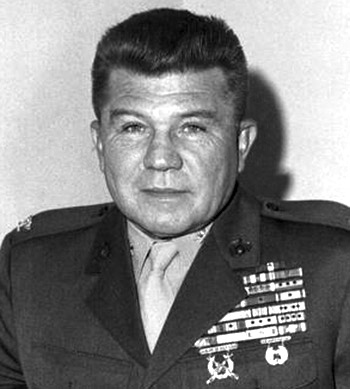
|
Van D. Bell, Jr. |
 |
|||
| Rank, Service | ||||
Colonel O-6, U.S. Marine Corps |
||||
| Veteran of: | ||||
|
||||
| Tribute: | ||||
Van Bell was born on August 25, 1918, in Atlanta, Georgia. He enlisted in the U.S. Marine Corps on March 13, 1936, and after completing basic training he served with the 4th Marine Division in China during the 2nd Sino-Japanese War, and aboard the heavy cruiser USS Augusta (CA-31) in the Pacific as an orderly and as Admiral Harry E. Yarnell's personal bodyguard. During World War II, MSgt Bell served in the battles of Guadalcanal, Bougainville, Guam, and Okinawa with the 1st Marine Division, and received a battlefield commission for short time as a 2nd Lt, reverting back to MSgt by the end of the war. He was then given a commission as a 1st Lt in the Marine Corps on September 21, 1945, serving at Camp Lejeune, North Carolina, until November 1945, when he entered the Admin Officer Training Course at MCS Quantico, Virginia, graduating in January 1946. Lt Bell served at MCS Quantico and at NAS Miami, Florida, from February to November 1946, followed by service in China with the 1st Marine Regiment from January 1947 to May 1949. His next assignment was to Marine Barracks, USNB Newport, Rhode Island, from June 1949 to February 1951, and then with the 7th Marine Regiment in Korea from March 1951 until he was wounded and sent back to the U.S. in October 1951. During combat in Korea, Lt Bell served as Executive Officer of B Company, 1st Battalion, 7th Marines, and then as Commanding Officer of A Company, 1st Battalion, 7th Marines. After recuperating from his injuries, he served with the Marine Barracks at USNB San Francisco, California, from February to March 1952, and then with Headquarters 6th Marine Corps Reserve and Recruitment District in Atlanta, Georgia, from April 1952 to April 1954. Capt Bell next served at Marine Barracks, USNB Charleston, South Carolina, from April to July 1954, followed by attending the Junior Course at MCS Quantico from August 1954 to June 1955. His next assignment was as Commander of the Marine Detachment aboard the aircraft carrier USS Valley Forge (CV-45) from July 1955 to September 1956, and then as S-3 and Executive Officer with the 2nd Marine Regiment at Camp Lejeune from September 1956 to October 1958. He served on the staff of MCB Camp Lejeune from October 1958 to December 1960, and then on the staff of the Maintenance Battalion at MCSC Albany, Georgia, from January 1961 to June 1963. Col Bell next served on the staff of Headquarters MCRD Parris Island, South Carolina, from August 1963 to October 1965, followed by service in Vietnam from December 1965 to July 1967. During this time, Col Bell participated in combat operations as Executive Officer of the 3rd Marine Regiment of the 3rd Marine Division from December 1965 to March 1966, then as Commanding Officer of 1st Battalion, 1st Marine Regiment of the 3rd Marine Division from April 1966 to June 1967, and finally as Executive Officer of the 1st Marine Regiment from June to July 1967. His next assignment was as Division Inspector for the 2nd Marine Division at Camp Lejeune from August 1967 to June 1969, followed by service as Commanding Officer of Marine Barracks and Ground Defense Force at USNB Guantanamo Bay, Cuba, from July 1969 to August 1971. Col Bell next served as Chief of Staff for Landing Forces Training Command at USNAB Coronado, California, from September 1971 to November 1973, and then as Commanding Officer of MCB Camp Butler, Okinawa, from January to December 1974. His final assignment was as Special Projects Officer at MCB Camp Lejeune from January 1975 until his retirement from the Marine Corps on July 1, 1975. Van Bell died on June 3, 2009, and was buried at Arlington National Cemetery. |
||||
|
||||

